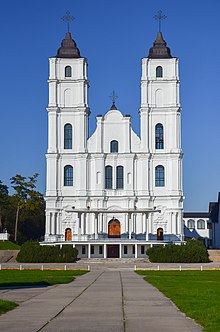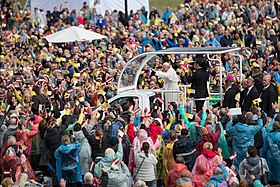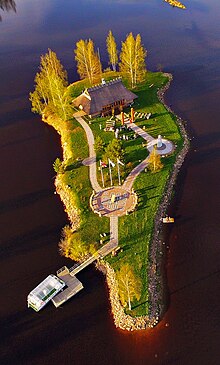Religion in Latvia
Religion in Latvia (2019 estimate)[1]

The main religion traditionally practiced in Latvia is Christianity. As of 2019[update], it is the largest religion (68.84%),[1] though only about 7% of the population attends religious services regularly.[2]
History

Latvia was one of the last regions in Europe to be
Despite the Christianization, the local populace in the countryside maintained their pagan belief system for several centuries, with pockets of paganism surviving in Latvia up until the 17th century. Along with the rest of the traditional holidays, Christmas (
During the
Because of the state policy of atheism during the Soviet era and the general European trend of secularization, religiosity declined drastically, and today a growing percentage of Latvians claims not to follow any religion, with low church attendance.
Demographics
According to the Annual Report of Religious Organizations and their Activities published by the Ministry of Justice (MOJ), based on 2022 data, the largest religious groups are Lutheran (37 percent), Roman Catholic (19 percent), and Latvian Orthodox Christian (13 percent);[6] almost 30 percent of the country is unaffiliated to any religious group.
In a survey from 2015, the
In the same year the
The Latvian polling agency SKDS has also gathered information regarding the religious affiliation of Latvia over the years. In 2018, 26% of the population was Orthodox, 20% identified as Catholic while 17% was Lutheran, and 3% were Old Believers. 14% believed in God without being affiliated to any religion, while 15% declared themselves as atheist. A further 3% belonged to other Christian sects or religions.[9][10]
| Religious affiliation (%) | 1860 | 1897 | 1935[11] | 2000[12] | 2001[13] | 2003[12] | 2005[12] | 2006[12] | 2007[12] | 2008[12] | 2009[12] | 2010[12] | 2011[12] | 2014[14][9] | 2016[9] | 2018[9] |
|---|---|---|---|---|---|---|---|---|---|---|---|---|---|---|---|---|
| Orthodox | 8.9 | 8.6 | 8.9 | 22 | 18.9 | 25 | 24 | 26 | 24 | 24 | 23 | 23 | 25 | 25.6 | 25 | 26 |
| Catholic | 18.4 | 20.2 | 24.5 | 19 | 22.3 | 21 | 21 | 20 | 22 | 22 | 24 | 23 | 21 | 22.6 | 22 | 20 |
| Lutheran | 66.4 | 59.1 | 55.2 | 28 | 23.8 | 25 | 20 | 21 | 21 | 24 | 22 | 20 | 23 | 18.4 | 20 | 17 |
| Old Believer | 3.2 | 4.1 | 5.5 | 2.7 | 3 | 4 | 2 | 2 | 4 | 3 | 3 | 4 | 4 | 2 | 3 | |
| Judaism | 3.2 | 7.4 | 4.8 | |||||||||||||
| Other faiths / denominations | 0 | 0.6 | 1.2 | 2 | 2 | 2 | 1 | 1 | 3 | 3 | 1 | 4 | 3 | 2 | 2 | 3 |
| Belief in God without religion | - | - | - | 10 | 12.8 | 9 | 11 | 10 | 10 | 10 | 10 | 11 | 9 | 9.7 | 10 | 14 |
| Atheist | - | - | - | 18 | 17.7 | 12 | 16 | 14 | 14 | 11 | 15 | 16 | 14 | 16.4 | 17 | 15 |
| Undecided | - | - | - | 3 | 2 | 3 | 3 | 6 | 4 | 2 | 2 | 0 | 1 | 2 | 2 | 3 |
Graphs are unavailable due to technical issues. There is more info on Phabricator and on MediaWiki.org. |
Religion in Latvia, SKDS surveys 2000-2018
Religion in Latvia today


The
As of 2022[update], the population of
The Reformed Church in Latvia is a small Reformed denomination with two congregations in Riga.
As of 2011, the Justice Ministry had registered 1145 congregations.
In 2022 Latvia passed a law removing all influence or power over the Orthodox Church from non Latvians, which would include the Patriarch of Moscow, making the Orthodox Church of Latvia completely independent.[18]
- Church membership
In 2011, churches in Latvia provided the following estimates of church membership to the Justice Ministry:[10]
| Adherents | Number |
|---|---|
| Lutherans | 708,773 |
| Catholics | 430,000 |
| Orthodox | 370,000 |
| Old Believer Orthodox | 34,517 |
| Baptists | 6,930 |
| Seventh-day Adventists | 4,046 |
| Pentecostals | 3,268 |
| Evangelicals | 3,171 |
| New Generation | 3,020 |
| New Apostolics | 1,268 |
| Latter-day Saints | 852 |
| Methodists | 751 |
| Dievturi | 663 |
| Augsburg Lutheran | 581 |
| Salvation Army | 462 |
| Jews | 416 |
| Muslims | 319 |
| German Lutheran | 308 |
| Jehovah's Witnesses | 290 |
| Old Apostolics | 287 |
| Buddhists | 155 |
| Reformed | 145 |
Freedom of religion
In 2023, the country was scored 4 out of 4 for religious freedom.[19]
See also
References
- ^ a b "Ziņojums par Tieslietu ministrijā iesniegtajiem reliģisko organizāciju pārskatiem par darbību 2019.gadā" (in Latvian). 2019. Retrieved 29 July 2023.
- ^ Eunice K. Y. Or (23 September 2004). "Trust in Religious Institutions does not convey to Church Attendance". Christian Today. Retrieved 28 July 2007.
- ^ Encyclopedia of Global Religion by Mark Juergensmeyer, Wade Clark Roof; page 111.
- ^ State Responses to Minority Religions by Dr David M Kirkham, p.
- ^ Atlas of Eastern Europe in the Twentieth Century by Richard Crampton, Benjamin Crampton; p. 90; "Inter-war Latvia: Religious composition"
- ^ "US State Dept 2022 report on Latvia".
- ^ "Country specific religious affiliation or denomination: Latvia - weighted". International Social Survey Programme: Work Orientations IV - ISSP 2015. 2015 – via GESIS.
- ^ "DISCRIMINATION IN THE EU IN 2015", Special Eurobarometer, 437, European Union: European Commission, 2015, retrieved 15 October 2017 – via GESIS
- ^ a b c d Kaktiņš, Arnis (2018-09-24). "Lūk, kā izskatās Latvijas iedzīvotāju reliģiskās un konfesionālās piederības pēdējās 3 aptaujās, kur tas ir ticis prasīts. Kā redzams, tad par katoļiem sevi patlaban uzskata ~ 20% iedzīvotāju. Pareizticīgo ir vairāk: ~ 26%, bet luterāņu mazāk: ~ 17%.pic.twitter.com/hM5kHIxeXZ". @ArnisKaktins (in Latvian). Archived from the original on 2019-06-20. Retrieved 2019-06-20.
- ^ a b c d e f "Tieslietu ministrijā iesniegtie reliģisko organizāciju pārskati par darbību 2011. gadā" (in Latvian). Archived from the original on 2012-11-26. Retrieved 2012-07-25.
- ^ Ceturtā tautas skaitīšana Latvijā. 1935. gadā. Valsts statistiskā pārvalde. 1936.
- ^ a b c d e f g h i "Religion in Latvia (2000-2011)" (PDF). Latvian Centre for Human Rights. 2016.
- ^ LETA (2001-07-10). "Latvijā it tikpat daudz katoļu, cik luterāņu". delfi.lv (in Latvian). Retrieved 2019-06-20.
- ^ "Visvairāk - pareizticīgo". la.lv. 2014.
- ^ Reliģiju Enciklopēdija, Statistika (in Latvian). Accessed 2009-07-23.
- ^ Ščerbinskis, Valters (1999). "Eastern Minorities". The Latvian Institute.
- ^ "US State Dept 2022 report on Latvia".
- ^ "Orthodox Church of Latvia seceded from Moscow – It was a matter of national security, says the President". 10 September 2022.
- ^ Freedom House website, retrieved 2023-08-08
Further reading
- Stradiņš J (1996). "Martin Luther and the Impact of the Reformation on the History of Latvia. - Dialogue between Christianity and Secularism in Latvia". Annals of European Academy of Sciences and Arts. 15 (VI): 75.
- Klīve V (1993). "The Latvian Struggle for Survival: A Religious Perspective". Humanities and Social Sciences. Latvia (1): 51–52.

